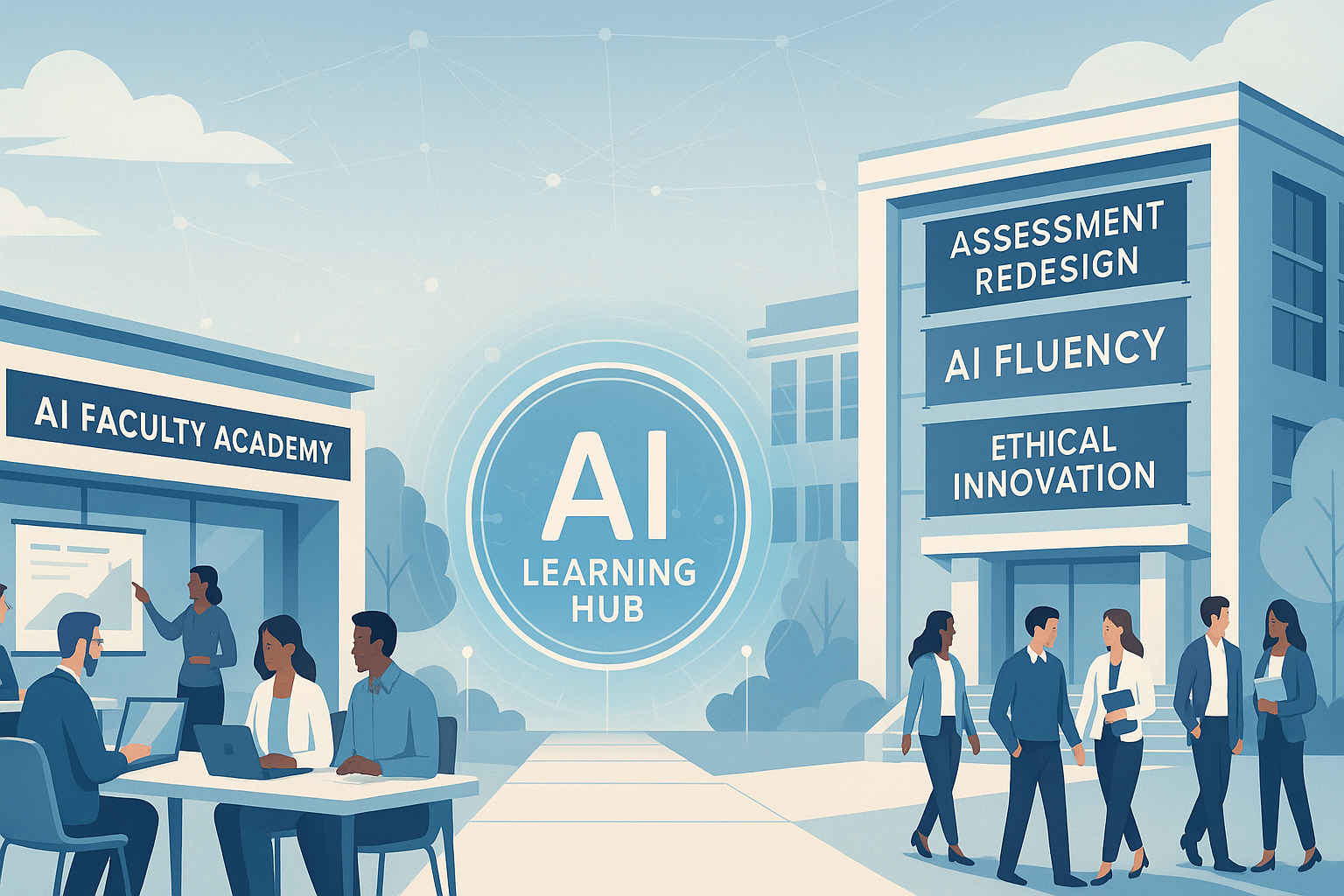AI in higher education has moved far beyond experimentation. The new frontier isn’t about adding more technology—it’s about building systems that expand human learning and close gaps in opportunity. Colleges and universities are no longer tinkering with tools; they’re aligning pedagogy, policy, and purpose to make AI an enabler of equity and access.
Across public systems and research institutions, leaders are embedding AI tutoring, ethics frameworks, and data-informed teaching into the heart of their academic missions. The pattern is unmistakable: the institutions advancing fastest are the ones grounding AI innovation in human-centered values—equity, ethics, and educator empowerment.


System-Wide AI Tutoring in Open-Access Higher Ed
The Details
California’s 116 community colleges are launching a unified 24/7 AI tutoring program through Nectir, providing free academic support to more than one million students. The initiative uses course-aligned prompts, personalized study planning, and faculty dashboards that reveal student misconceptions early. Integration with the system’s LMS allows instructors to tailor interventions before students fall behind (Axios, 2025).
Why It Matters
This statewide initiative demonstrates how AI can democratize learning support. By extending faculty reach and reducing tutoring inequities, California is transforming AI from a convenience into a catalyst for educational justice. It’s a model for how public systems can use technology to ensure that access and affordability remain at the center of student success.
ChatGPT and the Rise of Self-Directed Adult Learners
The Details
In this peer-reviewed study, Lin examines how adult learners use ChatGPT to strengthen self-regulation, persistence, and reflective learning. Through qualitative interviews, participants described AI as a “study partner” that improved discipline and confidence when guided by structured prompts. Faculty who implemented reflective AI exercises saw increased motivation and engagement without losing instructional connection (Lin, 2024).
Why It Matters
Lin’s research reframes ChatGPT from a productivity shortcut to a partner for adult learning. It underscores that when used intentionally, AI supports learner autonomy and critical thinking—core principles of andragogy. For educators, it offers evidence that guided AI use can deepen learning without diminishing academic rigor.
Policy & Governance
-
TEQSA Warns: Detection Alone Won’t Save Assessment
Australia’s higher-education regulator, TEQSA, cautioned that chasing AI detection tools is “a dead end.” Instead, it encourages assessment redesign that elevates reasoning and originality through oral defenses, project iterations, and reflection. This approach ensures fairness across student populations by rewarding process, not perfection (Australian Government Department of Education, 2025).
-
Mapping the Field: What 138 Studies Reveal About AI in Higher Ed
A systematic review of 138 studies shows that AI applications in education have diversified rapidly—from tutoring and analytics to academic advising. However, the authors warn that without ethical oversight and equitable implementation, innovation risks deepening existing inequalities (International Journal of Educational Technology in Higher Education, 2023).

Programs, Research & Infrastructure
-
The GenAI Learning Ecology: A Blueprint for Adult Education
This 2024 Adult Learning article presents the GenAI-ALE framework, which maps how instructors, learners, and systems collaborate in AI-enhanced environments. The framework prioritizes equity, inclusion, and digital fluency—ensuring that generative AI augments rather than replaces human teaching (Adarkwah, 2024).

Do It Now Checklist
Betting on Faculty-Led AI Literacy
Faculty-led AI literacy isn’t about mastering code or model training—it’s about mastering interpretation. It means understanding what large language models can and cannot do, recognizing their limitations, identifying bias or hallucination, and using that awareness to guide students ethically. This literacy combines three core competencies:
-
Interpretive skill—the ability to evaluate AI output critically and contextually.
-
Ethical awareness—knowing when and how AI use aligns with institutional values.
-
Pedagogical creativity—designing learning that uses AI to extend human curiosity and inclusion.
Higher education’s AI future will rise or fall on these capabilities. The institutions leading the charge are those investing not in more tools, but in more trust—equipping educators to model discernment, design fairness, and drive equitable innovation. Betting on faculty-led AI literacy means investing in educators as the architects of trust, autonomy, and transformation.
Respectfully,
Lynn “Coach” Austin
References
All sources are hyperlinked in-text for immediate access to original publications.


